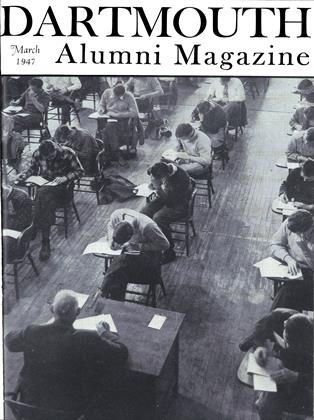THE reader certainly gets his money's worth in Kenneth Roberts' new novel Lydia Bailey (Doubleday), for he gets not one novel but two and possibly three. Roberts writes with great power, especially in scenes of action, but often his characters, especially, in this instance, Lydia Bailey, get lost in a maelstrom of action as far removed as Boston, Haiti, and Tripoli. It is, of course, fatuous for a reviewer in a short space to criticize blithely such a monumental novel as this which took the author six years to write. That he had difficult problems of technique to solve the dedication to his friend Ben Ames Williams '10 proves, and one could surmise this anyhow. I found myself most interested, curiously enough, in the first two hundred pages. The story of Toussaint L'Ouverture in Haiti is a book in itself, and I feel that the Preble-Tripoli episode is, too. Both are done with superb integrity to truth, though the author may have drawn a biased picture of Tobias Lear. His characters often tend to be altogether too black, or too white, to be real. His fine indignation at current tendencies in dictatorial governments (our own) and judicial intolerance, is sharply revealed, for Fascism is not a new thing as we have known for a long time. Readers have told me they couldn't put the book down and it will surely hold the interest of most. I was amused by the fact that one of the most treacherous characters bore one of my family names (and they were from Boston, too). I hope it sells more than the million copies printed, though it is not my favorite Roberts novel. For me this remains Rabblein Arms, though his finest writing, I think, is the first half of Northwest Passage.
Davis (Stoney) Jackson '36, at the moment in Australia, is a collector of Australiana and recently wrote me that I must read Ernestine Hill's My Love Must Wait, which is a deft and sensitive historical novel about Matthew Flinders, navigator, explorer, and perhaps the most important single character in the early history of Australia. It is a fine book. A poignant love story, together with the fact of Flinder's early death, makes the book more moving than if all had ended with a happy dawn.
All interested in the country down under should also read Thomas Wood's excellent travel book, Cobblers, published first in 1934 by the Oxford University Press, since revised, and now in its sixteenth or more printing. Wood was in Australia in 193133-33, and covered the continent pretty well. I felt that this was really Australia with all its good and bad points. His story of his two visits to the Barrier Reef was most interesting, and those who have been in Australia will find that this book may well corroborate many of their own impressions.
A book which will amuse you is Pat Frank's Mr. Adam (Lippincott). An atomic explosion in Mississippi renders all men sterile save one: Homer Adam, who, when the explosion occurred, happened to be deep underground in a protecting lead mine. The author pokes fun at bureaucracy, government red tape, and women, in a light manner, and as you can guess beforehand, Mr. Adams does not keep his priority as Number One Male forever. This makes for good fun and the play or movie from this book may well be a great hit.
William Wister Haines in CommandDecision (Little, Brown) has given us the low-down, or part of it, on an American bomber command based in England before the invasion. It is real, angry, and dramatic, and after talking with many Dartmouth pilots I am convinced of its essential veracity. Haines spent thirty-three months overseas and knows what he is writing about. I hope a lot of flyers will read it, and others, too, for it certainly has the low-down on visiting Congressmen, Washington politicians, and certain members of the High Command who had to be everything at once. From what I hear, many of the brass hats have not changed but this must be said for them: they did win the greatest war in history starting from scratch. Or rather men like General Dennis did. This is the story of Operation Stitch, which was a bombing operation aimed at destroying three towns which were making a new German jet plane which could outfly at that time anything we possessed. The mission had to be accomplished whatever the cost, and was, in spite of difficulties which would have defeated a man less able and courageous than Dennis. Read it and weep.
 View Full Issue
View Full Issue
More From This Issue
-
 Article
Article"Free as the Air"
March 1947 By JERRY A. DANZIG '34, -
 Class Notes
Class Notes1918
March 1947 By ERNEST H. EARLEY, DONALD L. BARR -
 Article
ArticleRadio Interprets the News
March 1947 By CEDRIC FOSTER '24, -
 Class Notes
Class Notes1937
March 1947 By JOHN H. DEVLIN, ARTHUR H. RUGGLES JR. -
 Article
ArticlePHYSICS FOR THE FUTURE
March 1947 By PROF. ARTHUR B. MESERVEY '06. -
 Class Notes
Class Notes1921
March 1947 By DONALD G. MIX, ROBERT M. MACDONALD
HERBERT F. WEST '22
-
 Article
ArticleHanover Browsing
February 1940 By HERBERT F. WEST '22 -
 Books
BooksFROM STAR TO STAR
November 1944 By Herbert F. West '22 -
 Books
BooksTHE EDUCATION OF YOUTH AS CITIZENS
July 1947 By Herbert F. West '22 -
 Article
ArticleHanover Browsing
November 1949 By HERBERT F. WEST '22 -
 Books
BooksSIDEWHEELER SAGA
July 1953 By HERBERT F. WEST '22 -
 Article
ArticleA Dartmouth Bookshelf
January 1958 By HERBERT F. WEST '22








